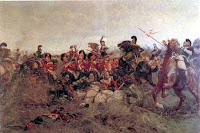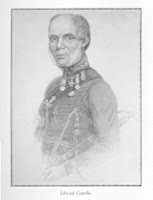 First, Happy Birthday to Sarah and John (30 and 33 today). Sarah is in Mexico and has just phoned to tell us that James has proposed to her today! She accepted. John and Ruth, his new wife, would like to be in Mexico but have just bought a house and can't afford holidays for the next 100 years.
First, Happy Birthday to Sarah and John (30 and 33 today). Sarah is in Mexico and has just phoned to tell us that James has proposed to her today! She accepted. John and Ruth, his new wife, would like to be in Mexico but have just bought a house and can't afford holidays for the next 100 years.One of the joys of having a new daughter in law is that, because she is a vegetarian, we have had to extend our culinary knowledge base. Learn to cook plants. I used to think that the most potent argument against vegetarianism was 'THE BACON SANDWICH' (fanfare and pause for applause). But I have become enlightened and although 'THE BACON SANDWICH' (fanfare) is still a force to be reckoned with there are some very forceful counter arguments in the vegetarian camp. One being the Artichoke! You may stand aghast but try this recipe.....s'good....honest.
Got it from BBC - Sunday Kitchen by Celia Brown
Preparation time less than 30 mins. Cooking time 30 mins to 1 hour
Ingredients
4 large fresh globe artichokes
1 tbsp butter
2 cloves garlic, chopped
300g/10oz mixed wild mushrooms, especially morels, chanterelles and ceps, cleaned and chopped into small chunks
2 tsp fresh thyme or lemon thyme leaves
80ml/ 3fl oz vermouth
150g/6oz mascarpone cheese
salt and pepper
25g/1oz pecans, crushed
a handful of flat-leaf parsley leaves, chopped
1 potato, boiled and mashed
olive oil
vinegar
Method1. Bring a large pan of water to the boil for the artichokes. Add a good glug of both vinegar and olive oil to the water and plenty of salt.2. To prepare the artichokes, snap off the stem and slice about a third off the top. Pull out what you can from the middle and use a spoon to scoop out all of the hairy choke. Place in the boiling water and cook until tender, about 30-40 minutes. They are done when a leaf pulled from toward the centre comes away without resistance. Drain upside-down until dry. Preheat the oven to 220C/400F/Gas 6.3. To make the stuffing, melt the butter on moderate heat in a wide frying pan and add the mushrooms, garlic and thyme with a sprinkling of salt and pepper. When they have absorbed the butter and begin to soften, pour in the vermouth and cook, stirring, until it has mostly evaporated. Finally, stir in the mascarpone. Allow it to melt and coat everything with its sweet creaminess.4. Spoon into the middle of the drained artichokes. Sprinkle with crushed pecans and bake for about 10 minutes, until heated through and golden on top. Finish with chopped parsley before serving. When eating, use the leaves of the artichoke to scoop out the creamy filling. Serve on a bed of mashed potato.
I found that the artichokes go black after cutting unless you coat them with lemon juice. I also put lemon juice in the water to boil the artichokes instead of vinegar.
Enjoy! I served it to Ruth (daughter in law) and her Mum (Jean) and they survived!!
Back to the 'BACON SANDWICH' (fanfare and wild adoration).
In April the BBC reported that scientists (from Leeds University) had, apparently, created a mathematical formula of how to make the perfect bacon butty and discovered the secret to the ideal sandwich lay in how crispy and crunchy rashers were.
They found that two or three back bacon rashers should be cooked under a preheated oven grill for seven minutes at about 240C (475F).
The bacon should then be placed between two slices of farmhouse bread, 1cm to 2cm thick.
Four researchers at the Department of Food Science spent more than 1,000 hours testing 700 variations on the traditional bacon sandwich (You see they are not a University just to waste their time!!).
They tried different types and cuts of bacon, cooking techniques, types of oil and a range of cooking times at different temperatures.
A shortlist was then tested with computers to measure the texture of each sandwich.
Fifty volunteers also judged each sandwich according to its taste, texture and flavour.
Dr Graham Clayton, who led the research, said: "Our research proves that texture and the crunching sound is important. While there was much debate within our taste panels on the smoked or unsmoked decision, everyone agreed that tough or chewy bacon is a turn-off."
The formula is: N = C + {fb (cm) . fb (tc)} + fb (Ts) + fc . ta, where N=force in Newtons required to break the cooked bacon, fb=function of the bacon type, fc=function of the condiment/filling effect, Ts=serving temperature, tc=cooking time, ta=time or duration of application of condiment/filling, cm=cooking method, C=Newtons required to break uncooked bacon.
I could have told them that



















 This is the only portrait of him I could find. Casting? How about David Tennant!
This is the only portrait of him I could find. Casting? How about David Tennant!

